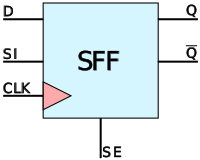From WikiChip
Difference between revisions of "scan flip-flop"
(Undo revision 93462 by 91.11.121.152 (talk) that's not a typo. it's a MUX'ed input device) |
(→Overview) |
||
| (One intermediate revision by the same user not shown) | |||
| Line 3: | Line 3: | ||
== Overview == | == Overview == | ||
| − | A scan flip-flop is a [[D flip-flop]] with a [[multiplexer]] added at | + | A scan flip-flop is a [[D flip-flop]] with a [[2x1 multiplexer]] added at its input D. one input of the MUX acting as the functional input D when SE/TE=0 and the other input serving as the Scan-In (SI) input when SE/TE=1. Scan/Test Enable (SE/TE) is used to control the MUX i.e used as selection bit. Scan flip-flops are used extensively for device testing. |
== Chain == | == Chain == | ||
Latest revision as of 15:47, 8 September 2021
A scan flip-flop (SFF) is a muxed input master-slave based D flip-flop. In other words, a scan flip-flop is a D flip-flop that allows its input to come from an alternative source.
Overview[edit]
A scan flip-flop is a D flip-flop with a 2x1 multiplexer added at its input D. one input of the MUX acting as the functional input D when SE/TE=0 and the other input serving as the Scan-In (SI) input when SE/TE=1. Scan/Test Enable (SE/TE) is used to control the MUX i.e used as selection bit. Scan flip-flops are used extensively for device testing.
Chain[edit]
| This section is empty; you can help add the missing info by editing this page. |
See also[edit]
| This article is still a stub and needs your attention. You can help improve this article by editing this page and adding the missing information. |

